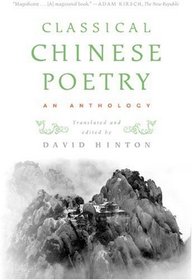Search -
Classical Chinese Poetry: An Anthology
Classical Chinese Poetry An Anthology
Author:
With this groundbreaking collection, translated and edited by the renowned poet and translator David Hinton, a new generation will be introduced to the work that riveted Ezra Pound and transformed modern poetry. The Chinese poetic tradition is the largest and longest continuous tradition in world literature, and this rich and far-reaching anthol... more »
Author:
With this groundbreaking collection, translated and edited by the renowned poet and translator David Hinton, a new generation will be introduced to the work that riveted Ezra Pound and transformed modern poetry. The Chinese poetic tradition is the largest and longest continuous tradition in world literature, and this rich and far-reaching anthol... more »
The Market's bargain prices are even better for Paperbackswap club members!
Retail Price: Buy New (Paperback): $17.39 (save 30%) or
Become a PBS member and pay $13.49+1 PBS book credit
![header=[] body=[Get a free book credit right now by joining the club and listing 5 books you have and are willing to share with other members!] Help icon](/images/question.gif?v=b2af7df3) (save 46%)
(save 46%)ISBN-13: 9780374531904
ISBN-10: 0374531900
Publication Date: 2/2/2010
Pages: 512
Edition: 1
Rating: ?
ISBN-10: 0374531900
Publication Date: 2/2/2010
Pages: 512
Edition: 1
Rating: ?
0 stars, based on 0 rating
Publisher: Farrar, Straus and Giroux
Book Type: Paperback
Other Versions: Hardcover
Members Wishing: 2
Reviews: Amazon | Write a Review
Book Type: Paperback
Other Versions: Hardcover
Members Wishing: 2
Reviews: Amazon | Write a Review
Genres:
- Literature & Fiction >> Poetry >> Anthologies
- Literature & Fiction >> Poetry >> Chinese
- Literature & Fiction >> Poetry >> Asian
- Literature & Fiction >> World Literature




